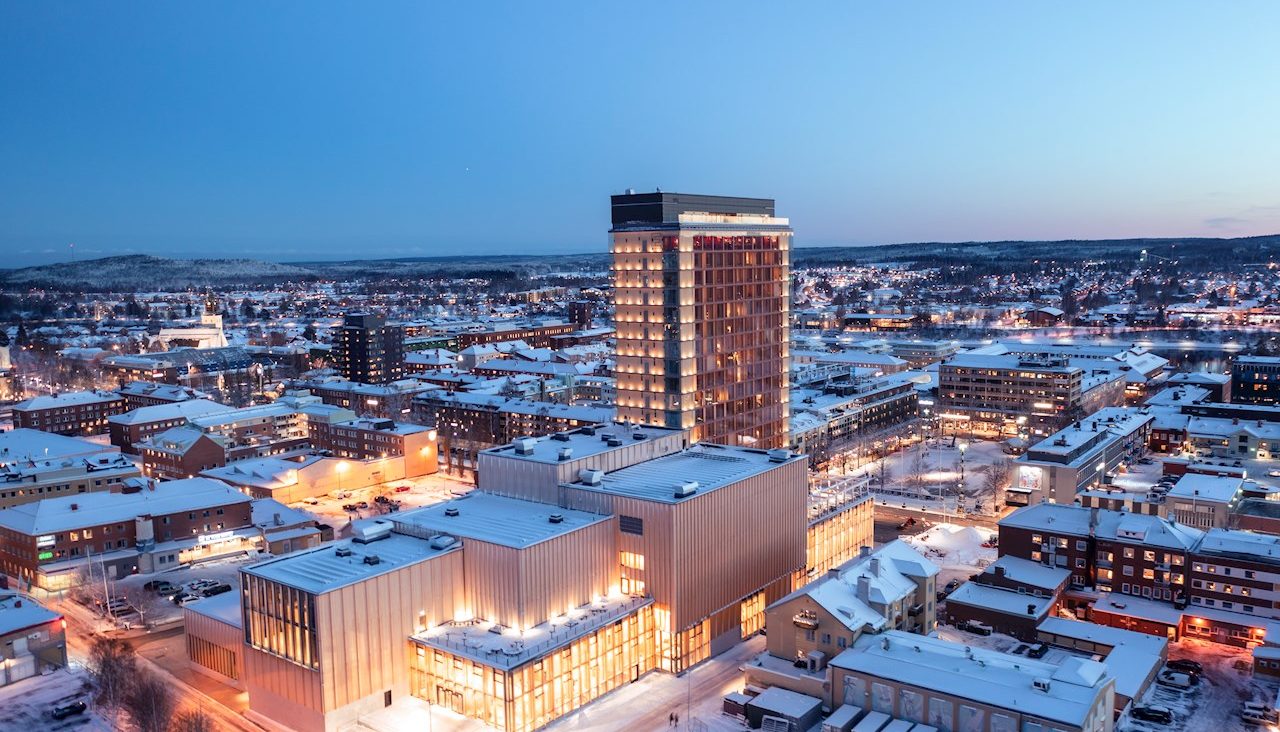The Sara Kulturhus is a state-of-the-art cultural venue and hotel in Skellefteå, Sweden. It is home to the city library, a museum and art gallery and a theatre which stages 450 performances a year. Standing 75m tall, the 20-story timber building is one of the world’s tallest wooden structures and is an international showcase for sustainable design and construction, with 100 percent of its electricity coming from renewable sources, including hydro and wind generation. The timber structure is so sophisticated that it removes more than twice the carbon emissions produced by the operational energy it uses and the embodied carbon from the production and transport of the materials used to construct it.
As a zero-emissions site, the Sara Kulturhus design required careful consideration and innovative solutions, such as its unique battery energy storage system (BESS) which was designed collaboratively by Skellefteå Kraft and ABB to provide reliable, clean power to the building’s all-important fire sprinkler system.
In a timber construction like the Sara Kulturhus , the sprinkler system is critical to keeping staff and visitors in the building safe. Traditionally, this fire protection system would be powered by emergency diesel generators, which serve as an onsite power supply should the mains power not be available. With the Sara Kulturhus’ commitment to sustainability, there is no diesel generator on site, so an alternative solution was required.
Skellefteå Kraft and ABB worked together on a bespoke energy storage solution to deliver maximum safety and reliability while harnessing the building’s hydroelectric green electricity, received from the grid, which is used as the power supply. The bespoke BESS comprises six battery packs from local supplier Northvolt, AC and DC switchgear from ABB, inverters from EPC Power and a transformer.
For Patrik Sundberg, Business Manager at Skellefteå Kraft, the BESS installation at the Sara Kulturhus was the culmination of a journey of collaboration between his company, ABB and Swedish battery supplier Northvolt. He said: “This is a truly sustainable, negative carbon building that operates on 100 percent renewable energy. Our solutions had to mirror this, so it was important to find a sustainable safety solution to power the sprinklers that didn’t use diesel. To reduce the site’s carbon footprint, it was also key to work with local suppliers, like battery manufacturer Northvolt. This innovative new concept really pushes the boundaries on the use of battery energy storage for fire prevention applications and will set a new standard for sustainable buildings in the future.”
With the unique wooden design of the building, ABB’s packaged solution was built, and factory tested off-site and then energized in the basement of the Sara Kulturhus. To make it easier to manage the BESS and to ensure a reliable 24/7 power supply for the building’s sprinkler system, the solution was supplied with a custom ABB eStorage OS energy management system to provide next level energy monitoring, diagnostics, and data and analytics. As well as optimizing energy use internally, this advanced autonomous AI technology interfaces with the building management system, allowing the center to interact with nearby buildings so any excess renewable energy generated can be supplied to other parts of the city when required.
Sara Kulturhus CEO Anna Jirstrand Sandlund said: “This is a lighthouse project which embodies the region’s values of delivering ecological, economical, and social impact to attract more people to Skellefteå and supports the green transition across North Sweden. With a wooden building of this scale, fire safety had to be one of our main considerations. By collaborating with ABB and Skellefteå Kraft we have developed a unique solution that is now one of the highlights of our twice daily guided tours for visitors. With the building itself now a blueprint for sustainability, we continue to work towards equaling its impact on the inside and inspiring our visitors and residents to become more sustainable.”











